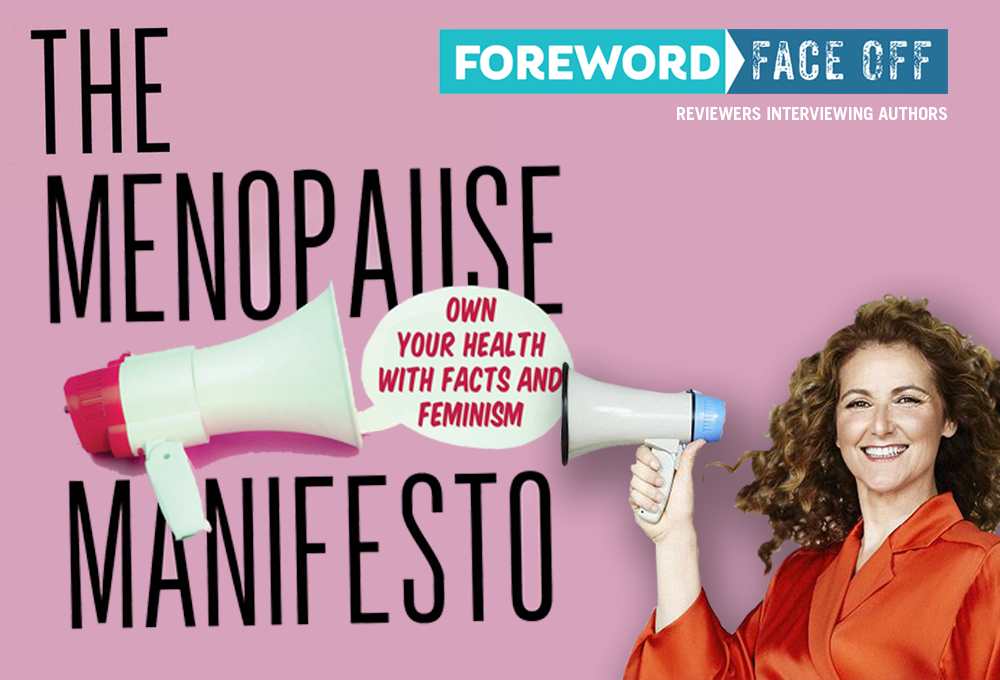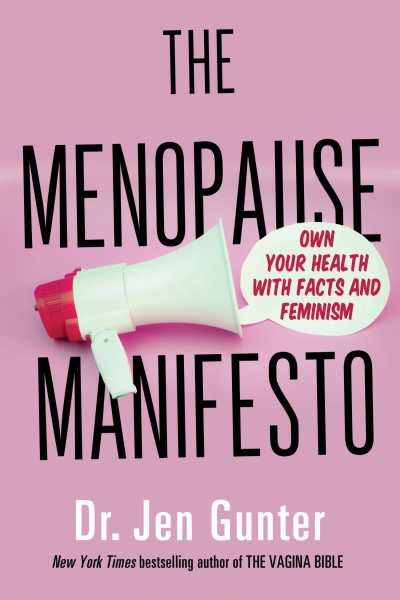Reviewer Erika Harlitz Kern Interviews Jen Gunter, Author of The Menopause Manifesto: Own Your Health with Facts and Feminism

Aging takes a toll on the body, that’s just a fact.
And for women, nothing in life looms larger than the day in middle age when their ovaries decide to call it quits. It can be a time of suffering, confusion, and shame—as if a central part of womenhood has been taken from them. Sadly, both science and society have only served to worsen the stigma, partly because society is cruel, and partly because menopause is so complex.

Yet, science has always known that in countless ways, the miraculous powers of evolution work to counteract the aging process, and with menopause specifically, we’re starting to understand the benefits to a family unit when grandmothers stop ovulating. “There is data that suggests a grandmother increases the number of grandchildren, and not because she was passing down fertility genetics, rather the physical proximity of a grandmother was what counted,” says Dr. Jen Gunter.
This “grandmother hypothesis” is one of the fascinating topics discussed in this week’s interview between Dr. Jen, author of The Menopause Manifesto, and Erika Harlitz Kern, the reviewer of Jen’s Manifesto in Foreword’s May/June issue.
Thanks to Kensington Books for helping to bring this hugely important project to women young and old.
Why did you write The Menopause Manifesto?
I was aware there was a lot of misinformation about menopause from my interactions with women in the office, but I didn’t appreciate how lonely women felt until I was on book tour for The Vagina Bible. Everywhere I went there were questions about menopause. I realized society—and that includes medicine—has done a terrible job with menopause. It is shrouded in shame and secrecy, and even though every woman who has or had ovaries will become menopausal, most really don’t understand the process or even why we have menopause? And that is terrible and I wanted to change it. I wanted to give women (and men) the facts, because when something is happening to your body and you are suffering and you don’t even really know what is going on, it is terribly disempowering. Information can help bring order to that chaos, and realizing you are not alone is itself powerful medicine. In addition to medical facts, I wanted to provide some cultural background to menopause, because we are here in this place where an aging woman’s body is shameful and not worthy of care or attention for a reason.
What does it say about women’s situation in society today that there is a need for a book like The Menopause Manifesto?
It says a lot, and none of it good.
There has been a fair bit of research into menopause in the past twenty or so years, and yet there is an information disconnect—meaning getting that quality information to women seems much harder than it should be. I think this knowledge gap is a by product of shame about menopause and ageism, after all, who wants to talk about something that makes you feel irrelevant? In addition, many doctors don’t have enough time and/or communication skills or they are not up to date on the latest therapies. And then there is the media. The press seems obsessed with rare side effects of therapies for menopause, yet not with rare side effects of medications for erectile dysfunction. There is also as massive explosion of disinformation from influencers and many so-called functional medicine doctors and naturopaths.
It feels as if the odds are stacked against the ability to get factual, practical information about menopause, but I am trying to change that.
In The Menopause Manifesto, you make a connection between evolution, menopause, and grandmothers as the unsung heroes of human survival. I thought that was really interesting to read. I was wondering if you could unpack that connection a little bit?
The story of menopause, as written by the patriarchy, is one of “ovarian failure.” Meaning, women are inferior in some way because they stop ovulating and that we only know that women stop ovulating because they are finally living long enough for menopause. However, we have data that suggests otherwise. The grandmother hypothesis suggests that living beyond ovarian function provided a collective benefit to the family unit and is not a recent phenomenon. There is data that suggests a grandmother increases the number of grandchildren, and not because she was passing down fertility genetics, rather the physical proximity of a grandmother was what counted.
Pregnancy is a huge biological toll, as is breastfeeding and caring for a human infant. During that time a woman has a harder time foraging for food or, with a newborn, caring for other children. A grandmother helped with those tasks, increasing the survival of her grandchildren. A grandmother can only help if she isn’t saddled with young children herself, so the winding down of fertility before the last menstrual period meant an ancestral grandmother was more able to help.
So, those ancestral women who lived a little past their last ovulation and were helpful had more grandchildren, and so the genetics that favored living beyond ovarian function became dominant. It is a totally different narrative. Menopause is about survival and usefulness to the collective, it isn’t about failure or frailty.
You also take a closer look at menopause symptoms and treatments according to socioeconomic factors and race. I was wondering if you could talk about the importance of including different kinds of variables when it comes to women’s health in general, and menopause in particular?
We know that social determinants of health and adverse childhood experiences play huge roles in health, so we must ensure studies are diverse so we can understand what is causation and what is correlation. For example, for many years most studies on menopausal hormone therapy were observational. As women who took hormones were more likely to be in good health as they had access to health care, this may have made hormones look more effective and safer than they actually were.
It’s also important that we acknowledge racism. For example, black women in America are more likely to have their ovaries removed at an early age (surgical menopause), exposing them to health risks. And because of racism, women of color may have less access to quality care, and so may not receive preventative care or help for bothersome symptoms.
You are active on social media. What is your take on the role social media plays in public debate, and how does that inform how and why you use social media the way you do? What can social media achieve that other types of media cannot?
Social media is both an amazing forum for good information and a vector of misinformation and disinformation. I think every dinner party also has this same challenge, so a lot of it is human nature, except bots and people with agendas, such as selling products, don’t typically infiltrate dinner parties.
I think social media is invaluable for health as it allows people to share experiences, and that is what people crave. They want to see a common experience and know they are not alone. After all, it is social media. It allows people to connect in ways we haven’t seen before. It also allows people access to a lot of curated information quickly, although the quality of that curation may vary.
What would you want a reader of The Menopause Manifesto to take with them from reading the book?
Menopause is not a disease and that much of the narrative about menopause has been written by a patriarchal society. I would like people to think of menopause as an evolutionary adaptation, just like puberty. Some women have bothersome symptoms, and others don’t. When symptoms are troubling, there are many evidence-based therapies (avoid compounded products, as those are not evidence-based). Menopause also starts a sequence of events that increases a woman’s risk of several medical conditions, such as heart disease, diabetes, dementia, and osteoporosis, so it’s important to be aware of guidelines for screening and prevention.
And, menopause is not a sign of weakness, it is proof of strength.
Erika Harlitz Kern
